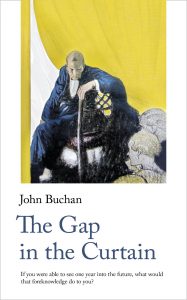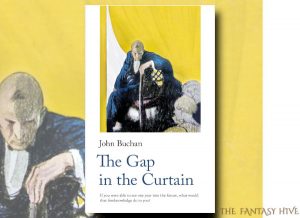THE GAP IN THE CURTAIN by John Buchan (BOOK REVIEW)
John Buchan – The Gap In The Curtain (1932, reissued 2021 by Handheld Press)
“‘But it was worth it,’ he added, getting up and reaching for his hat, ‘for I have learned one thing which I shall never gorget, and which I commend you to notice. Our ignorance of the future has been wisely ordained of Heaven. For unless man were to be like God and know everything, it is better that he should know nothing. If he knows one fact only, instead of profiting by it he will assuredly land in the soup.’”
John Buchan was a Scottish author, politician and historian, who is best known these days for his spy thriller The Thirty-Nine Steps (1915). However, he was also an author of supernatural and Weird fiction, something which Handheld Press have emphasised in the reprintings of his work. ‘No-Man’s Land’ (1899), collected in the Handheld Press volume British Weird (2020), is a fantastic example of just how powerfully he could evoke the Weird and the uncanny, and The Runagates Club (1928), republished by Handheld in 2017, features more of his Weird short fiction. The Gap In The Curtain (1932) was his last full-length work dedicated to the supernatural. The novel explores a handful of characters who during a party at a country-house become involved in an experiment to see the future. The novel explores how Buchan’s five characters react to the single piece of knowledge they each receive from the future, asking questions about fate and free will, and how foreknowledge would change one’s life. Whilst during the course of the novel Buchan displays many of the prejudices which colour his worldview, he also demonstrates his versatility and strengths as a writer, jumping from tragedy to social satire to political thriller with charm and ease. Republished with Handheld Press’s customary beautiful packaging and informative introduction and notes, the novel is a must-read for anyone interested in Buchan’s writing or his contribution to the Weird.
 The Gap In The Curtain is narrated by Edward Lethien, Buchan’s most frequently used character. Lethien is a barrister and MP, and had previously appeared in Buchan’s novel John Macnab (1925) as well as various short stories. He serves as an entry point for the reader, an avuncular, down to earth voice who can be trusted to report accurately the incredible things he witnesses. The novel begins with an exhausted Lethien visiting the country-house of his friend Sally Flambard for a party. Lethien finds himself chosen by the troubled but brilliant Professor Moe, an Einsteinian mathematician who has devised a way of seeing the future. Lethien and Sally are distracted by the death of Moe, but their five fellow party goers experience a vision of the Times newspaper a year to the day in the future, from which they each receive a single piece of information. Mr Arnold Tavanger, a rich businessman, sees an announcement of the formation of a monopoly for the production of the rare metal michelite. The Rt Hon David Mayot, a career politician, sees a news article that informs him that the Prime Minister will no longer be Labour politician Sir Derrick Tant but will be Mr Waldemar of the Liberal Party. Mr Reginald Daker, a Bertie Wooster-esque moneyed man of leisure, sees an announcement that he will be joining an archaeological expedition to Yucatan. Sir Robert Goodeve, a brilliant and politically ambitious young man, and Captain Charles Ottery, lovesick for the beautiful young Pamela Brune, both see their own obituaries. The novel, in episodic form, follows these characters as they react to the news of their futures and their various attempts to profit from our outrun their fate.
The Gap In The Curtain is narrated by Edward Lethien, Buchan’s most frequently used character. Lethien is a barrister and MP, and had previously appeared in Buchan’s novel John Macnab (1925) as well as various short stories. He serves as an entry point for the reader, an avuncular, down to earth voice who can be trusted to report accurately the incredible things he witnesses. The novel begins with an exhausted Lethien visiting the country-house of his friend Sally Flambard for a party. Lethien finds himself chosen by the troubled but brilliant Professor Moe, an Einsteinian mathematician who has devised a way of seeing the future. Lethien and Sally are distracted by the death of Moe, but their five fellow party goers experience a vision of the Times newspaper a year to the day in the future, from which they each receive a single piece of information. Mr Arnold Tavanger, a rich businessman, sees an announcement of the formation of a monopoly for the production of the rare metal michelite. The Rt Hon David Mayot, a career politician, sees a news article that informs him that the Prime Minister will no longer be Labour politician Sir Derrick Tant but will be Mr Waldemar of the Liberal Party. Mr Reginald Daker, a Bertie Wooster-esque moneyed man of leisure, sees an announcement that he will be joining an archaeological expedition to Yucatan. Sir Robert Goodeve, a brilliant and politically ambitious young man, and Captain Charles Ottery, lovesick for the beautiful young Pamela Brune, both see their own obituaries. The novel, in episodic form, follows these characters as they react to the news of their futures and their various attempts to profit from our outrun their fate.
Buchan follows these varied characters, and their different lives and spheres of activity allow him to indulge in a variety of genres, tones and approaches, which he does with charm and panache. We get to follow Tavanger across South Africa as he desperately tries to collect up stocks of michelite so he can profit from the merger. Then Buchan takes us to the realm of political satire, where we observe Mayot’s various attempts to position himself best to profit from the coming political change with zero regard for party or principles. Reggie Daker’s story is one of social satire and comedy, in which he finds himself entangled with an ambitious young woman named Verona Cortal whose audacious plans turn Reggie’s life of leisure on its head. Then, in the two most haunting sections of the novel, we witness Goodeves and Ottery struggle valiantly against their foreknowledge of their own deaths, in these two men’s very different ways.
Buchan’s strengths as a writer are considerable, and the range covered by the individual stories that make up the novel is impressive. The stories progress from the most trivial to the more serious tales, allowing Buchan to ratchet up the tension whilst exploring his central theme of fate versus free will from a variety of angles. He proves himself adept at both rollicking adventure story and sharply amusing political satire, as he takes the foibles of the British political system and career politicians to task. More dramatically, his stories of Goodeves and Ottery being haunted by their own mortality are both chilling and moving. Goodeves in particular is a wonderfully tragic character, and the contrast from his bright vitality and promising start in politics to his increasingly worn down and hunted outlook as his life slips away from him is convincing and well done. Buchan is an excellent example of British interwar writing, however as an upperclass Tory politician with very traditional ideas about money, class, women, and the British Empire, he has some unpleasant outlooks that make themselves felt in the text. His casual hero worship of Cecil Rhodes demonstrates the level of uncritical colonialism on display, and there are a number of anti-Semitic remarks casually made by his characters that make the modern reader thoroughly uncomfortable. But it is the thread of old fashioned British class ideals that are central to the novel that show his old fashioned attitudes in the starkest light. Buchan has very strong ideas about the superiority of the upper class, and the way that he villainises Verona for both being of new money and therefore unforgivably crass, and a woman who dares to take charge of her boyfriend’s life, detract somewhat from the Woodhouse-ian fun of Reggie’s story. However, for the reader who is willing to grapple with the limitations of Buchan’s worldview, there is much to enjoy in The Gap In The Curtain. As is the Handheld standard now, the book comes with an insightful introduction by Kate Macdonald, the founder of Handheld Press, who is an expert in Buchan’s fiction, and with extensive notes that contextualise and explain elements of the text.

